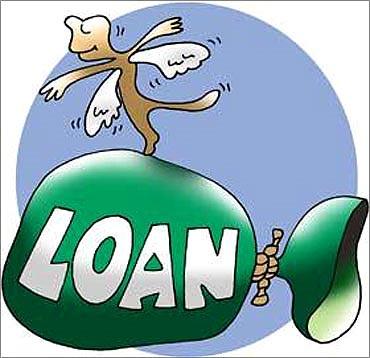
They associate the loan with liability, which it is, and like having the peace of mind that comes from knowing that the home they live in is theirs, with no encumbrances.
Let's look at their decision as a 'financial strategy' for the household's balance sheet and evaluate the choices objectively.
Click NEXT to read on...
But what portion of the house should be funded by a loan depends on how the value of the house can fluctuate. It may not appreciate in a straight line year after year but go through phases of falling in value as well.
Click NEXT to read on...

If the value of the house is dropping and the loan component is higher than its current value, a part of the loan should be prepaid to reduce risks.
The second principle is that money can always be put to alternative uses, which need objective comparison. We may be able to pay a higher equated monthly instalment (EMI) on receiving a bonus, inheritance, or any such large amount, which can be used to repay the home loan.
Click NEXT to read on...

If we are likely to leave that money in a bank deposit with a lower interest rate than the home loan, we are better off repaying the loan.
If we use the funds to buy a depreciating asset such as a car, we may still be better off repaying. If we choose to keep the funds in another appreciating asset, we need to be sure there is flexibility to pay off anytime we need to readjust the loans in our books. Buying another piece of illiquid land may not be a good idea, for instance.
Click NEXT to read on...
EMI is paid even when we face an income reduction, job loss, illness or any other similar risk. We think that repaying the loan when our income is high and when our ability to save has moved up is a better option.
Click NEXT to read on
We choose to pay the loan and own the house. To achieve this flexibility, we can either build assets or reduce the loan. To deal with the risk, we can build assets that will grow at a higher rate than the loan.
We can also choose a flexible and liquid option such as mutual funds, where we can deploy the surplus, instead of repaying the loan. We clearly build the asset to offset the liability on the loan.
Click NEXT to read on...
View your loan as a liability against which you need assets to keep the financial position healthy. As a rule of thumb, if your assets (including the house) are twice the value of the loan, your household balance sheet is healthy to carry the loan. Use your surplus funds to build assets.
The writer is managing director, Centre for Investment Education and Learning. Views expressed are her own.